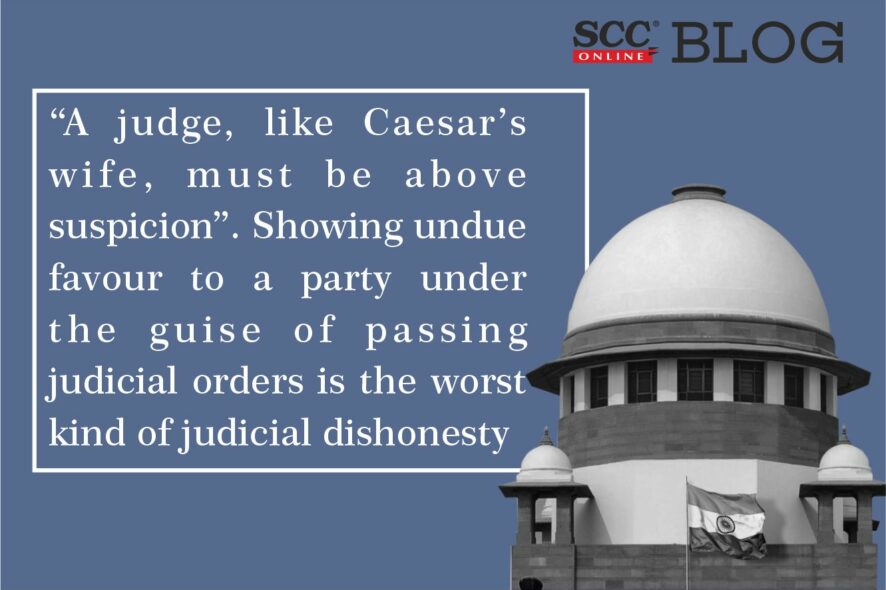Supreme Court: In a case where a Judge was accused of misconduct, the bench of Dr. DY Chandrachud and Bela M. Trivedi, JJ has held that showing undue favour to a party under the guise of passing judicial orders is the worst kind of judicial dishonesty and misconduct. The extraneous consideration for showing favour need not always be a monetary consideration.
“It is often said that “the public servants are like fish in the water, none can say when and how a fish drank the water”. A judge must decide the case on the basis of the facts on record and the law applicable to the case. If he decides a case for extraneous reasons, then he is not performing his duties in accordance with law. As often quoted, a judge, like Caesar’s wife, must be above suspicion.”
The appellant in the case at hand had joined the Uttar Pradesh Judicial Services in the year 1978 and sought voluntary retirement from the said services in September 2003. Immediately after the retirement, appellant joined as a Judicial Member, Central Administrative Tribunal, Mumbai Bench, Mumbai.
On 19.07.2005, the appellant was informed that the Allahabad High Court had initiated a departmental enquiry against him. There were twelve charges levelled against the appellant in the said chargesheet. It was alleged against that the appellant, while posted as the 11th Additional District Judge, Agra during the period from 23.05.2001 to 19.05.2003, had decided a batch of matters under the Land Acquisition Act, 1894 and had awarded enhanced compensation which was multiple times more than the investments made by the subsequent purchasers of the acquired lands; that such subsequent purchasers had no right to claim compensation for the acquired lands; that the appellant had determined the compensation in terms of square yards and not in terms of bighas, and had awarded such compensation in flagrant violation of the cardinal principles of law and equity and against all judicial norms and propriety, with a view to unduly favour such subsequent purchasers. It was therefore alleged that the appellant had failed to maintain absolute integrity and complete devotion to duty, and thereby had committed a misconduct within the meaning of Rule-3 of U.P. Govt. Servants Conduct Rules, 1956. Once charge levelled against the appellant pertained to an undue favour shown to the son of a Counsel named Shri KC Jain, by exorbitantly enhancing the compensation in his favour.
The Supreme Court observed that when the Enquiry proceedings have been found to have been conducted in proper and legal manner, and when the High Court on administrative side as well as on judicial side, has accepted the findings recorded by the Enquiry Officer qua the charge levelled against the appellant as “proved”, holding him guilty of having committed “misconduct”, it was not expected to sit as an appellate authority and revaluate the adequacy or reliability of the evidence adduced before the Enquiry Officer.
The Court observed,
“There was enough evidence and material to show that the appellant had misconducted himself while discharging his duties as a judicial officer, and had passed the judicial orders in utter disregard of the specific provisions of law, to unduly favour the subsequent purchasers of the acquired lands who had no right to claim compensation, and that such orders were actuated by corrupt motive. Under the circumstances, the High Court was perfectly justified in exercising its supervisory jurisdiction under Article 235 of the Constitution.”
[Muzaffar Hussain v. State of Uttar Pradesh, 2022 SCC OnLine SC 567, decided on 06.05.2022]
*Judgment by: Justice Bela M. Trivedi
Counsels
For appellant: Senior Advocate Pradeep Kant
For respondent no. 2: Advocate Charu Ambwani







